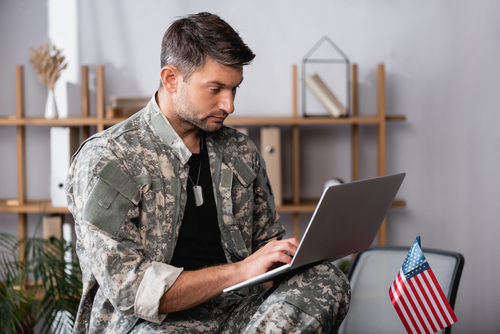In a recent survey commissioned by the Harris Poll on behalf of the University of Phoenix, most U.S. military members (93%) agreed that mental health is as important as physical health, but a third of military members (33%) reported never seeking out professional counseling, despite the majority experiencing lack of sleep (69%) and anxiety (61%).
This underscores the earlier finding of the University of Phoenix’s 2023 Career Optimism Index®, which revealed that mental health concerns were top of mind for American workers – 74 percent saying they feel stressed about their job/career but only 39% reporting that they have sought mental health resources to manage work-related stress.
Former military service members and veterans bring exemplary skill sets to the civilian workforce, including power skills like adaptability, performing under pressure, leadership, problem-solving, interpersonal and teamwork, and self-discipline. Civilian employer organizations can benefit from former servicemember and veteran contributions but may have concerns about the transition of encountering workplace stress creating risk factors.
In fact, by addressing mental health well-being for all workers, companies and organizations can create a supportive work environment that contributes to a sense of belonging for veteran employees.
Mental Health in the Workforce
Mental health for workers is in crisis. The 2023 Career Optimism Index® study found that 74% of American workers feel stressed about their job or career, and 47% are experiencing burnout on the job.
There is an urgent need for a fundamental shift. We need more people educated around mental health –– to understand what it might be to experience distress, to understand when they are witnessing it, and to help create a supportive work environment where managing mental health and stress loads are seen as an integral focus on overall health and well-being.
Veterans in the Workplace
What we found in the survey of military and veterans was that there are real improvements about attitudes toward mental health but there is more we can do. The findings indicate that the stigma of seeking help for mental health is still a barrier for military members.
While nearly two-thirds of active or non-active members have sought professional counseling, for those who have not done so, at least one-third of active or non-active military did not because they did not want to be perceived as weak. And the majority, about 60 percent, reported concerns about negative repercussions for seeking professional help—in the workplace or in the military.
This statistic is truly eye opening and underscores the urgency for business leaders to not just speak openly about mental health but also to actively foster a culture where it is embraced as a norm within their organization.
Support and Well-Being in the Workplace – 4 Simple Action Steps
Like all, of us, veterans have diverse experiences, relationships, and life events – and everyone needs people who care about them, including in the workplace.
We are encouraging business leaders and colleagues to:
- Learn more about mental health! We invite individuals to sign up to become a Give an Hour Wellness Ambassador and get access to use our tools and information, understand how to use them and improve your mental health literacy.
- Identify your best practices for building resiliency and share your practices with others! Leadership speaking about their experience receiving counseling is especially effective in helping other individuals be more open to and more likely to seek counseling and support.
- Get comfortable normalizing empowering conversations about mental health that foster connection and trust. For example, if a veteran shares an experience, you can actively engage in conversation, ask thoughtful questions, and show genuine interest in understanding their journey. This simple gesture can provide a sense of emotional support, appreciation and validation, as well as build trust and camaraderie—something veterans express missing when they leave military service.
- Finally, access resources that can help transform your workplace culture.
Working with trusted employer partners including Amazon, Booz Allen, CVS Health, Magellan Federal, Buckingham Consulting Group, LLC, Transcend, Veterans of Foreign Wars of the U.S. (VFW), the U.S. Chamber of Commerce Foundation and University of Phoenix, Give an Hour developed a Veteran Workforce Toolkit. Everyone from these organizations who helped inform the Tool Kit are veterans themselves, leading with compassion, empathy, and commitment to well-being.
Employers can work with Give an Hour to use the Toolkit as a guiding compass to support service members and prioritize the well-being of ourselves and others. The toolkit can serve as a supplement or complement to Employee Assistance Programs which are shown to have higher utilization rates when referred by a trusted source, when messaging is segmented and tailored toward different employee needs like veterans or women veterans or veterans of color or veterans in the LGBTQ+ community; and when relevant to specific work situations like conflict or stress management.
Over the next decade, with more than 200,000 service members transitioning to civilian life each year, leaders who get out in front and invest in the mental health of their workforce in a tailored way will see the results of these efforts in a happier, healthier, and more competitive workforce.
Together we’ve built something of undeniable value for our veterans – giving back to them after they’ve given so much of themselves to us.
Trina Clayeux, Ph.D., is CEO of Give an Hour. Eric Ryan is senior director, Office of Military and Veterans Affairs at the University of Phoenix and a veteran of the U.S. Marine Corps.

